Background:
Stratified offers a “datalog refinement” option with the purchase of their off-the-shelf IS20 ECU tune.
This refinement was explained to me as follows:
The way our datalog refinement works is customers will send us a set of logs on their tune and we will make some changes based on the logs to better match the fuel quality our customers have access to. Whether that is pulling power for safety or adding power if fuel quality is good. The fuel quality you are using is good and I was able to add some power to the tune here.
We also like to ask for another set of logs after the changes are made to the tune to confirm that the changes made had the desired affect and were not too aggressive. If you are able to send another set of logs on this revised tune to review, that would be ideal.
Stratified Automotive Controls
Since the Stratified tune is a bargain at $100 the extra $100 to have a tune that falls in between pure OTS and Custom tune seems like a good deal.

In the remainder of this post, I show the difference between the OTS file and the revised OTS file that was made for my GTI.
Comparison:
The next few charts show a comparison of the OTS file and the revised file’s basic engine variables.
This chart shows the increase in the boost level compared with the OTS file:
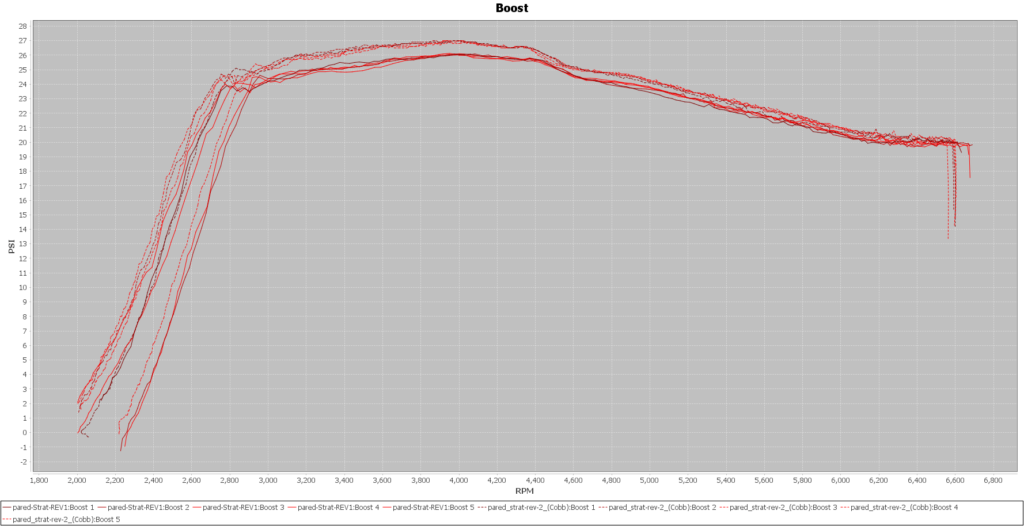
This chart also shows the boost change, except it is an average of the individual boost curves:
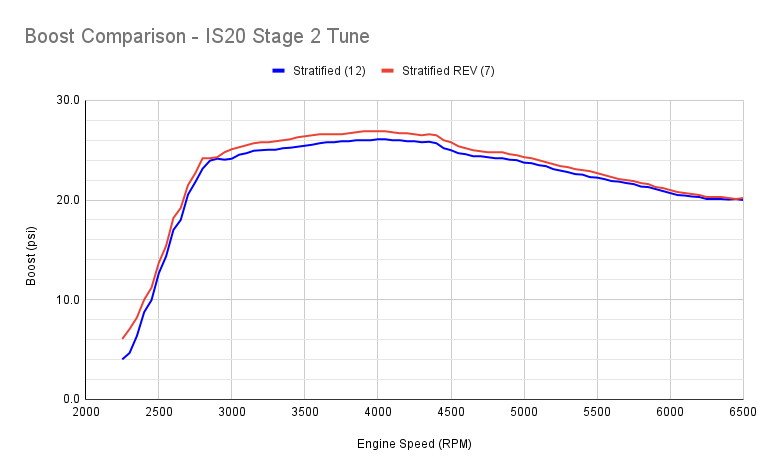
Timing is shown next. The red lines are the OTS file and the blue lines are the revised tune.
You can see that with the increase in timing advance, the instances of timing being reduced occur more often with the revised tune.
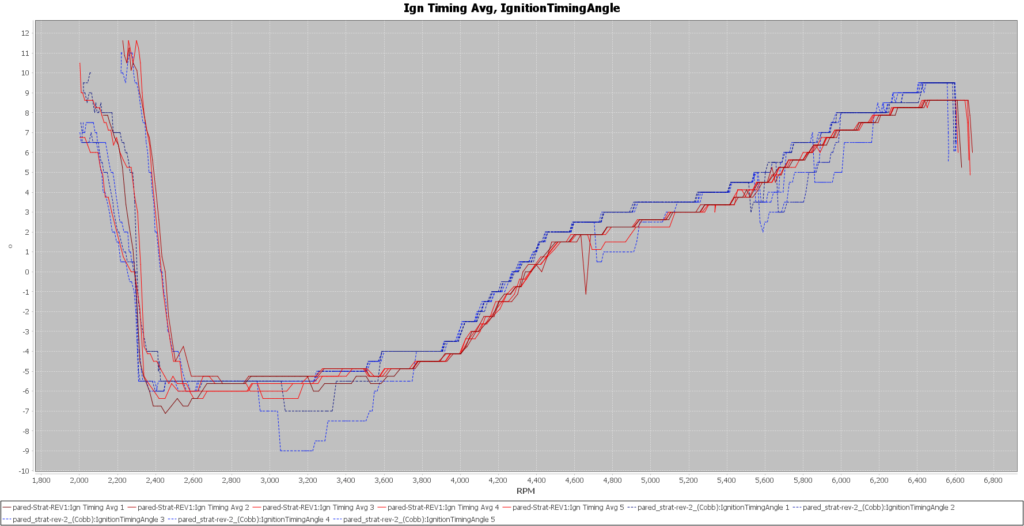
This chart is the average of the timing curves:
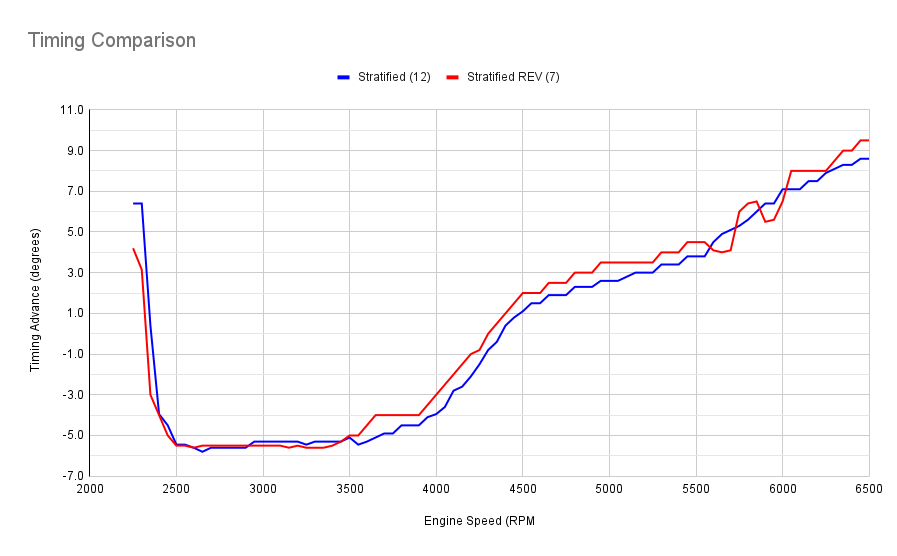
This next chart shows an overview of five (5) pulls made with the OTS file and a few instances where timing is reduced.
Across the 4 cylinders for all five pulls, there are four instances of timing being reduced by approximately 2 degrees each time, for a duration of approximately 400 RPM when timing is reduced.
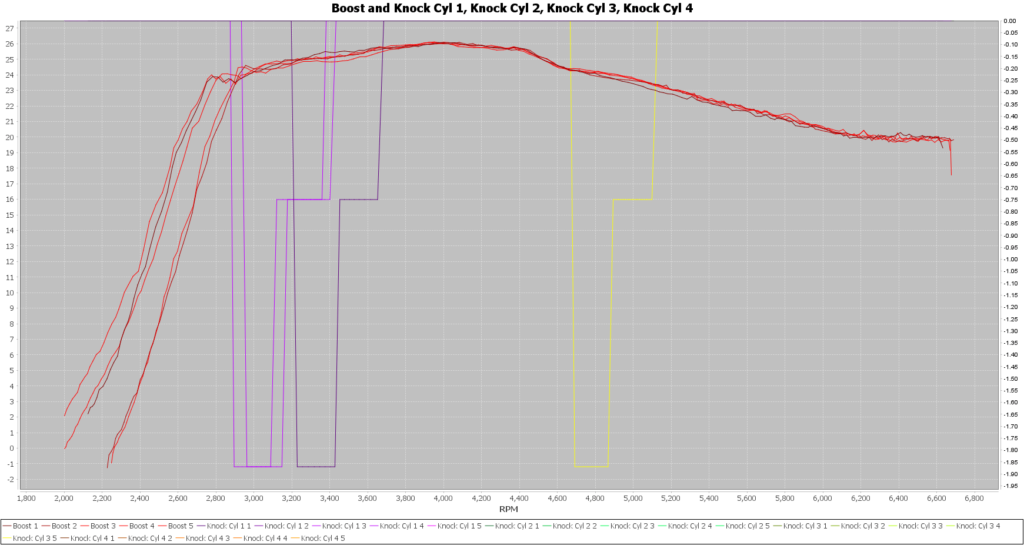
The next two charts show individual pulls:
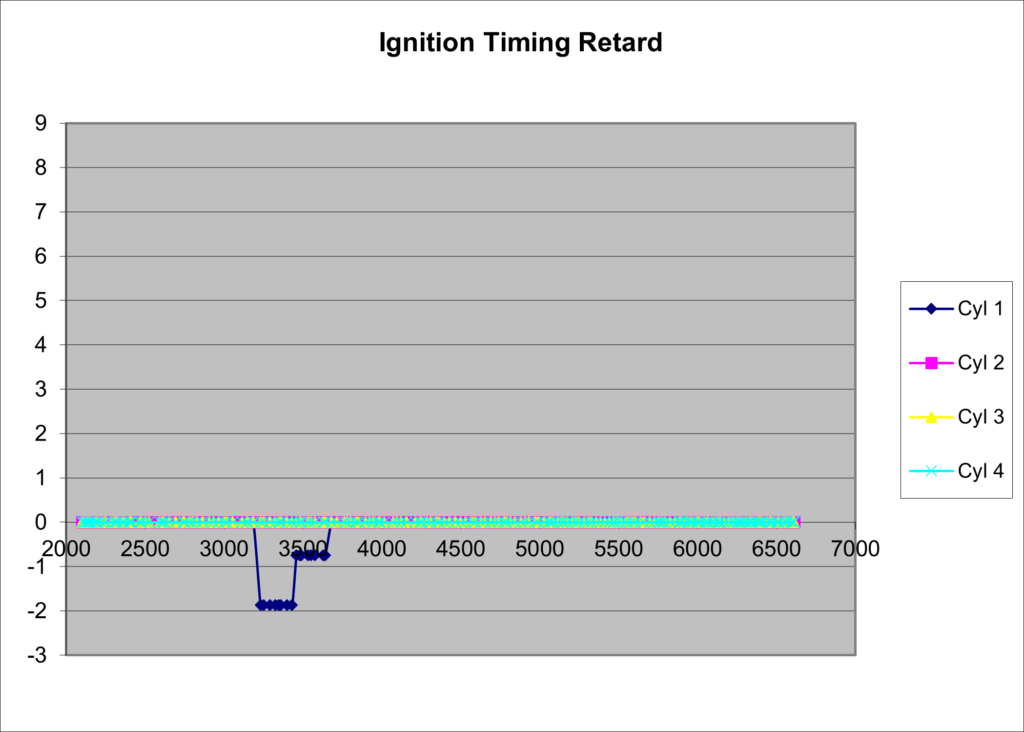
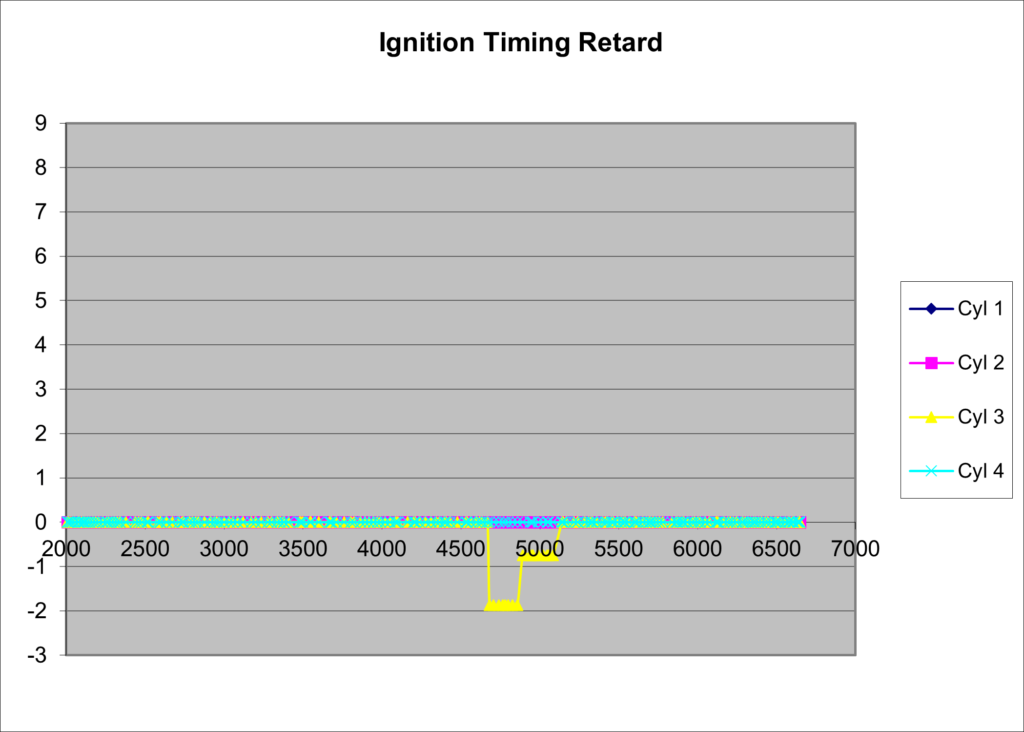
As the timing comparison chart above showed, Stratified increased the ignition timing of the Datalog Refinement file and the next charts show the impact of that change on the occurrences of timing being retarded.
Across the five pulls with the Refined file, there are more occurrences of timing being reduced.
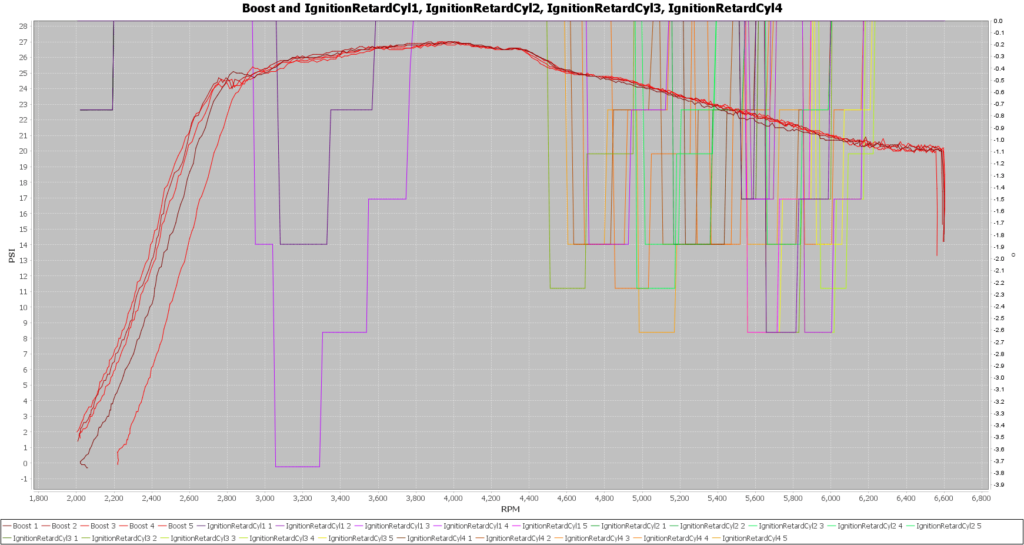
Looking at two individual pulls:
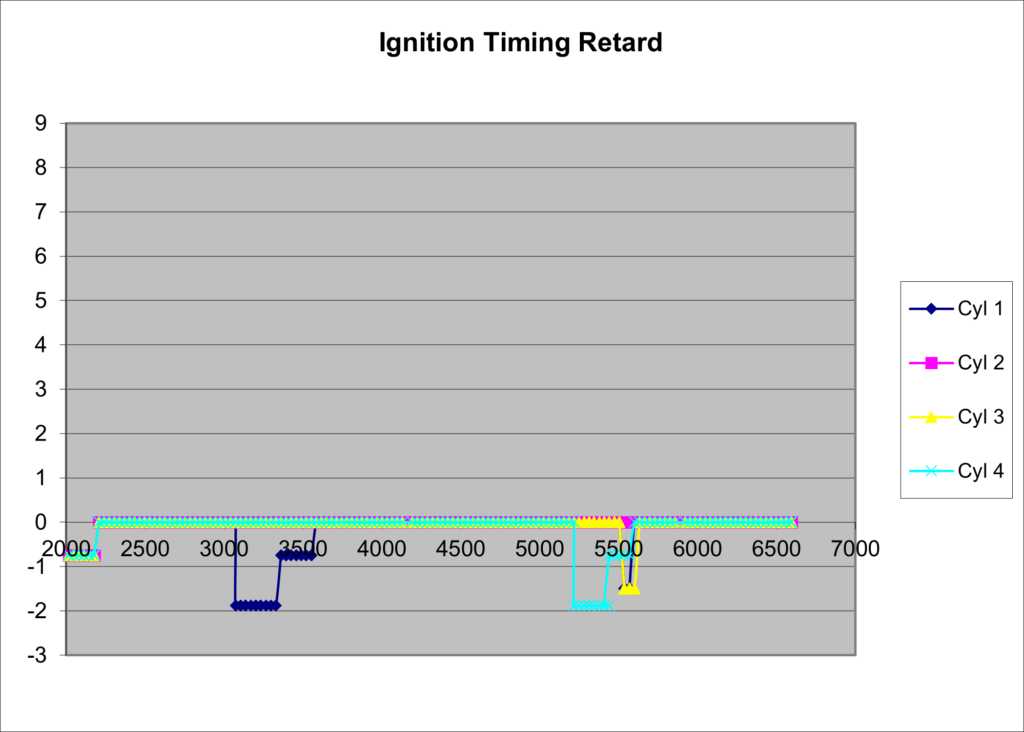
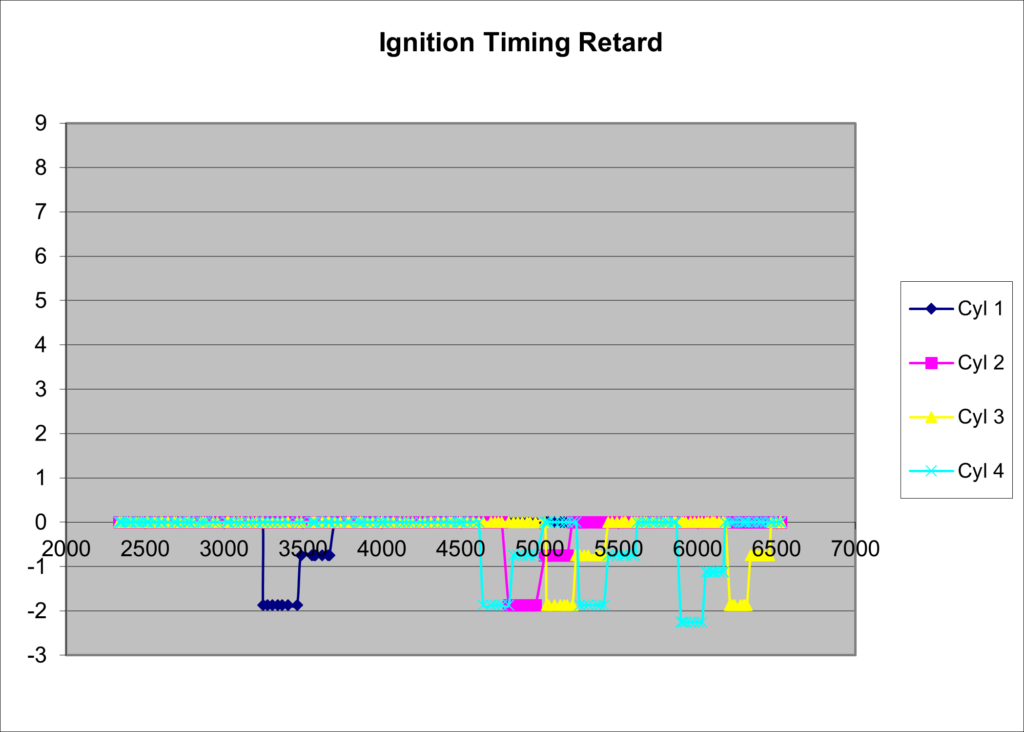
The duration and amount of timing reduction are similar between the OTS file and the Datalog Refinement file, but the occurrences of timing being reduced are significantly increased with the Datalog Refinement file.
A comparison of the Knock Threshold adjustments versus OEM values shows that the Datalog Refine tune is also operating with OEM-like Knock protection.
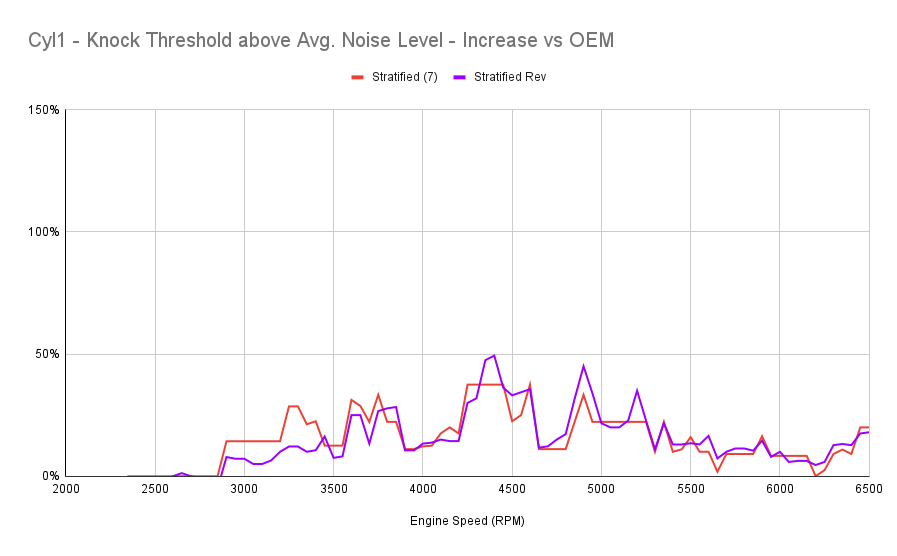
A more in-depth discussion of Noise and Knock Retard was made in conjunction with the Cobb Stage 2 Tune comparison.
KR Percentage
The next two charts present an overview of the series of pulls shown above with instances of timing reduction shown by the white vertical lines.
Each chart is sub-divided into four individual charts with each line containing data for one cylinder to give a sense of how often timing reduction is occurring across all of the cylinders.
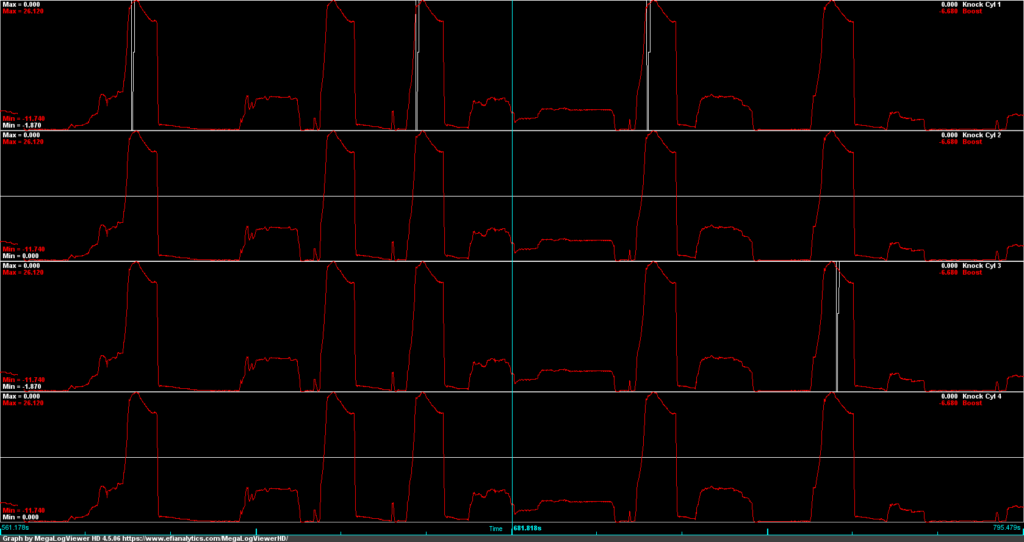
The next chart is the Datalog Revised tune, in which the increased number of white vertical lines corresponds to the greater number of occurrences of timing being reduced:
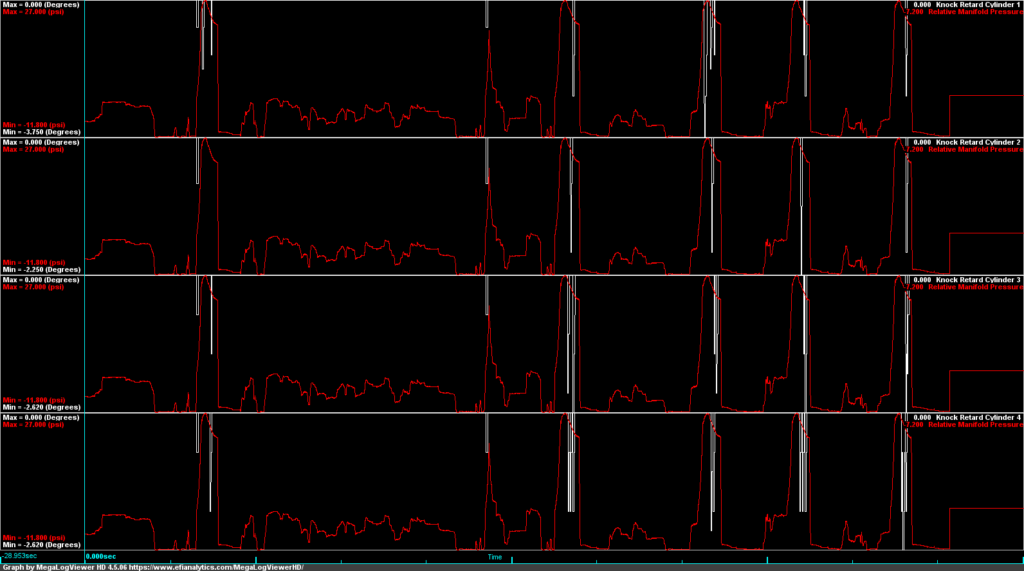
The number of instances of timing being reduced in a cylinder across all of the pulls forms the basis for a metric I am calling the Knock Retard Percentage (KR %).
This value is calculated as follows:
KR Percentage = Cylinders Showing Knock Retard/ (4 * Number Of Pulls)
In the examples above there are five pulls made with each tune. With the OTS file, there were 4 occurrences of a cylinder showing timing reduction.
This produces a KR % of 20%. (4 occurrences of timing retard divided by 20. Twenty comes from having 5 pulls multiplied by 4 cylinders.)
With the Datalog Revised tune the KR % increases to 95%. (19 instances of timing pulls divided by 20 opportunities.)
In conclusion, the higher boost and timing of the revised tune led the ECU to intervene much more frequently in the form of ignition timing reduction.
Vehicle Comparison:
Concerning the vehicle performance changes resulting from the tune refinement, on the street the estimated peak wheel horsepower increased from 320.5 WHP to 329 WHP.
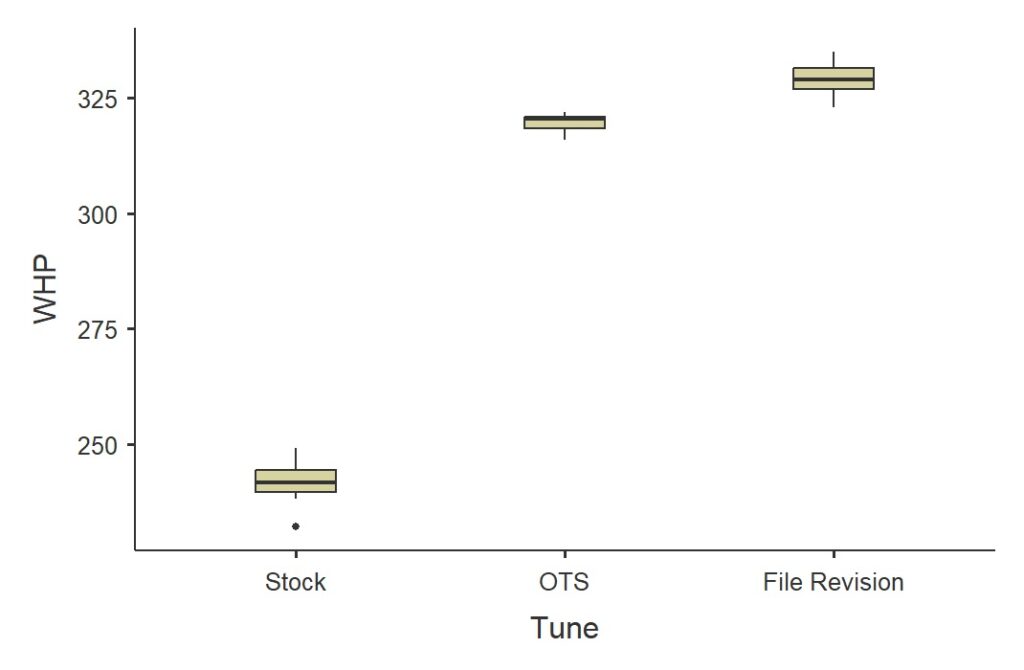
Dragy times from 47 to 84 mph decreased from an average of 4.42 seconds (11 samples) to 4.32 seconds (7 samples).
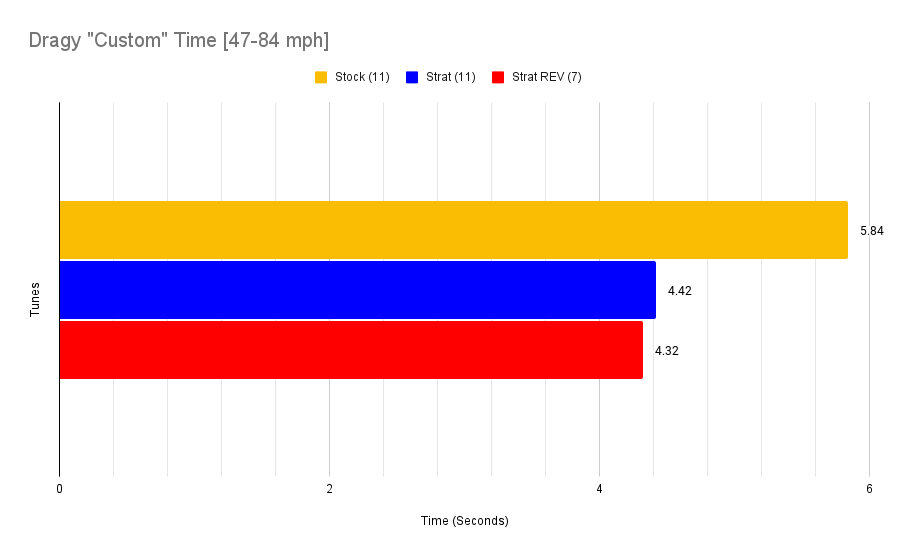
On the DynoJet dynamometer, the peak power gains averaged 5 WHP.
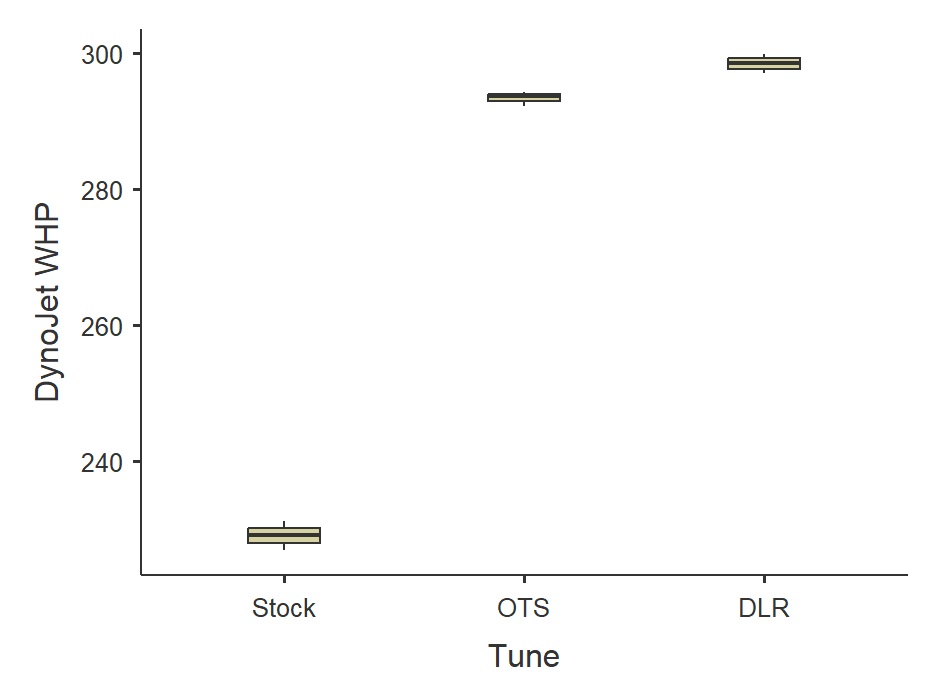
The increase in peak wheel torque on the DynoJet is 12 FT-LBS WTQ.

The dyno chart below compares the OTS tune with the Datalog Refined tune. The first three pulls are with the OTS file and the last four pulls are the Datalog Refined tune:
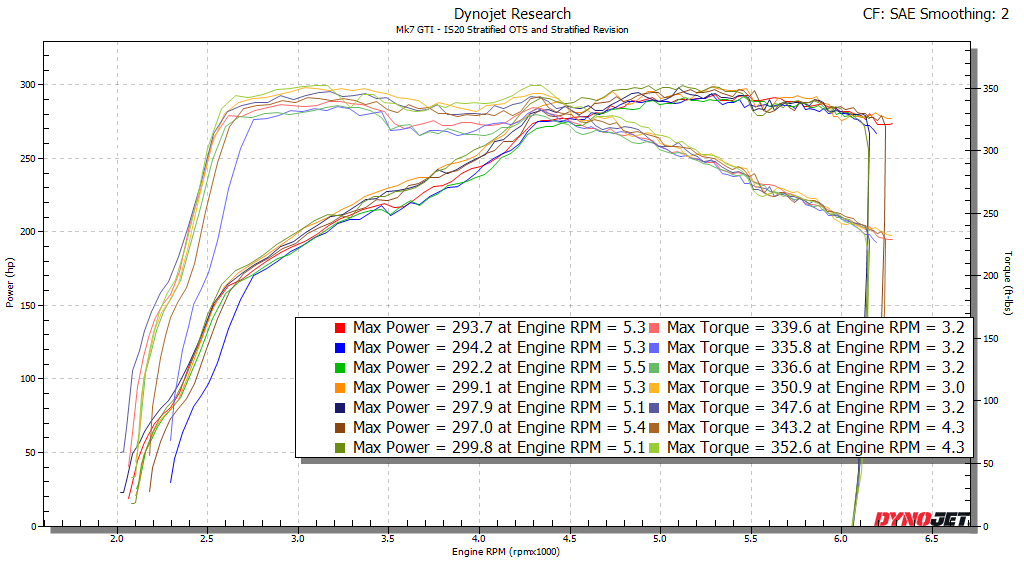
Stage 2 Tune Comparison:
With this update to the tune, the Stratified Revised file is shown compared to other Cobb-based tunes.
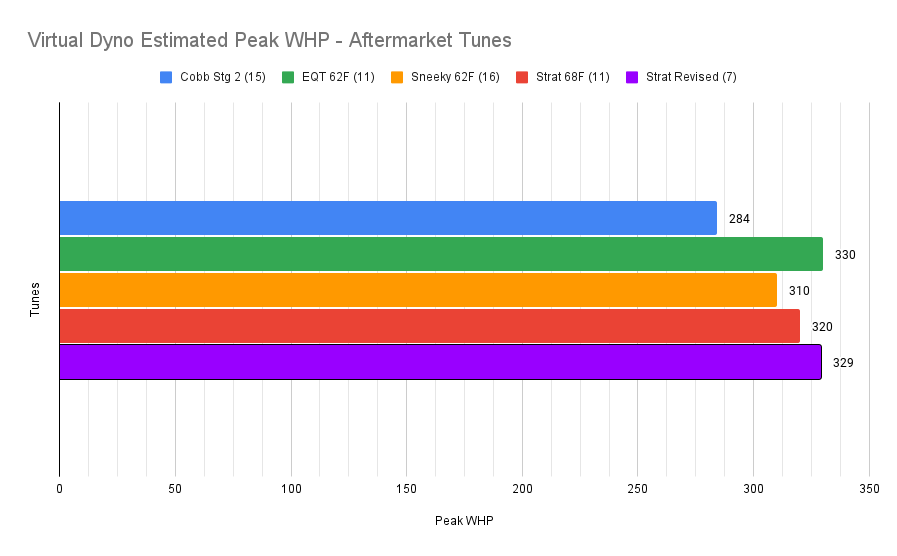
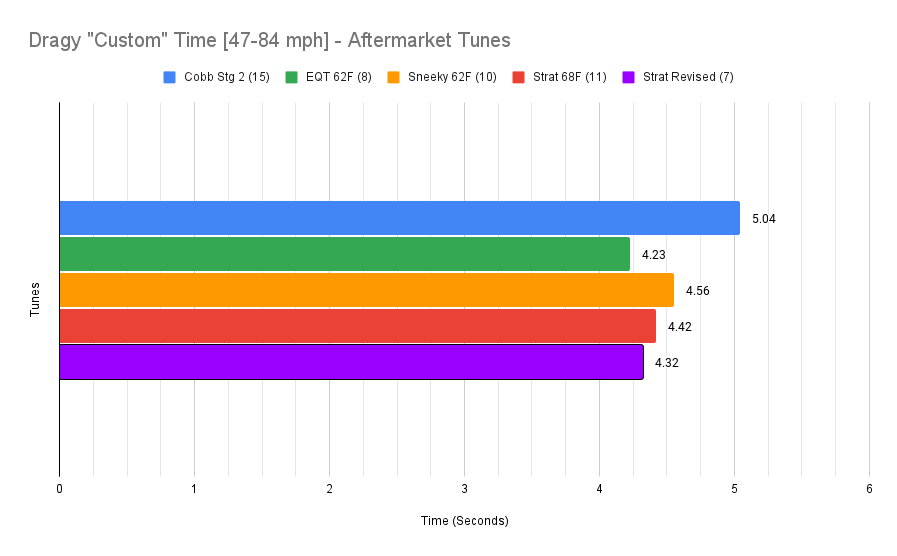
Conclusion:
A comparison was made between a Stratified off-the-shelf (OTS) tune and the same tune with a Datalog Refinement.
The revised file operated with higher boost pressure and timing advance. This combination of boost and timing operates right at the edge where the ECU intervenes to reduce potential knock events by pulling ignition timing while operating with the OEM-like knock mitigation safety levels.
These changes led to an 8.5 whp increase in peak power and a 0.1 second faster Dragy acceleration time from 47 to 84 mph.
These gains were accompanied by more instances of ignition timing being reduced momentarily by a couple of (on avg. ~2) degrees.
As an option to try and squeeze a little more from the Stratified OTS tune for low cost, the datalog refinement was successful.

Nice! Very interesting and does show that having some timing pull/retard isn’t necessarily a bad thing…pushing it further and allowing the ECU to pull some timing netted more power than the more conservative/no timing pull tune is how I interpret this.
Yes, it’s an interesting result and has some utility for gauging if knock threshold adjustment is being done with other tunes. My personal preference is not to have ignition timing being retarded as much as the revised tune shows. With the knock sensors being reactive, having timing retard indicates something occurred that was interpreted as potential knock. I’d rather not have that occurring since I don’t think it’s beneficial to long term reliability. I’d rather give up a couple HP for a longer service life.
Great post – really interesting to see that this revision cleared up that torque drop in the 3.5-4k range. I gave that to EQT in your other sneaky-eqt-strat post but now the EQT vs Strat difference is far less. I’d love to see this strat rev added to the “mk7-gti-cobb-ots-tune-dyno-summary” graphs. I picked up the strat tune myself to compare against EQT & APR…
Thanks! Since this tune has been customized I didn’t feel adding it to the OTS tune comparison was in the spirit of what I was trying to accomplish with that comparison. I’m working with Stratified now on a further customization of this tune, and once that is complete I’ll make a comparison of the progression of tunes.